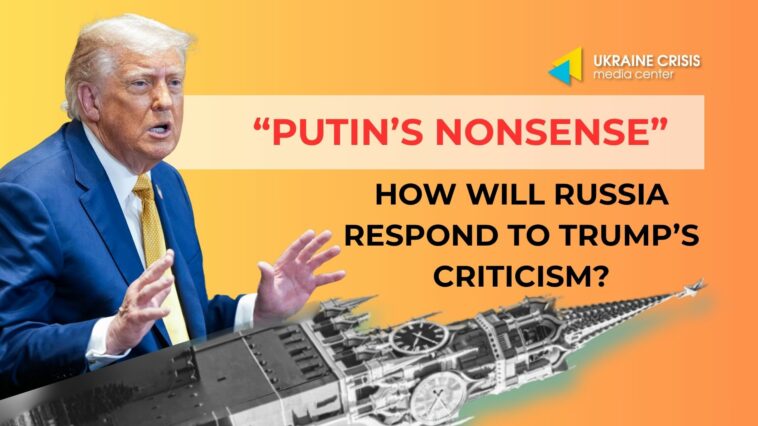On July 8, U.S. President Donald Trump made important statements regarding Washington’s policy on the Russia-Ukraine war. For perhaps the first time, he voiced harsh and principled assessments of his Russian counterpart. “We get a lot of bulls – thrown at us by Putin, if you want to know the truth. He’s very nice all the time, but it turns out to be meaningless”, – said the American leader.
In addition, Trump stated that he is “seriously considering” imposing sanctions on Russia. According to several American sources, the Graham-Blumenthal Senate bill on sanctions could be brought to the floor as early as Wednesday, July 9.
Trump also disavowed the earlier decision by the U.S. Secretary of Defense to suspend deliveries of critically important weapons to Ukraine, including anti-missile systems for air defense. “He (Putin) is killing too many people, so we’re sending some defensive weapons to Ukraine, and I’ve approved that. We’re going to send some more weapons. We have to. They have to be able to defend themselves,” – declared the U.S. President.
Trump began publicly expressing annoyance with Putin following a phone call with the Russian leader on July 3.
It is too early to speak of a definitive shift in the U.S. administration’s approach to relations with the Kremlin. However, a number of signs indicate Moscow’s anxious reaction to Trump’s rhetorical pivot.
Several Kremlin-linked Telegram channels quickly rushed to “remind” that Russia is continuing negotiations with Ukraine, as Washington demands. For example, the Telegram channel Taynaya Kantselyariya (441,000 subscribers) published a post on the afternoon of July 8 citing “internal sources” who claimed that “the basic parameters of a future memorandum with Kyiv are currently being coordinated.” The document reportedly aims to set out the principles of a potential political and diplomatic settlement. In addition to standard topics such as Ukraine’s “neutral status,” “humanitarian issues,” and “security guarantees,” Kremlin insiders say that territorial issues in the document are to be resolved “through the principle of de facto control (принцип фактического контроля).”
This framing of the “territorial dilemma” appears to be a novelty, especially in contrast to official Russian statements about Moscow’s uncompromising stance on full control over the Ukrainian regions it claims and Kyiv’s formal recognition of that control. Just recently, Russian Foreign Minister Sergey Lavrov reaffirmed the Kremlin’s maximalist position in an interview with the Hungarian outlet Magyar Nemzet.Ultimately, only Putin can define Moscow’s position regarding the goals of the so-called “Special Military Operation.” However, we currently see no indication that Putin is willing to address the territorial issue based on the principle of de facto control.
The Kremlin’s information campaign regarding the peace process is, in reality, intended to persuade U.S. leadership that Russia is open to certain concessions. In fact, Moscow is likely attempting to present Trump with a mirage of opportunities for progress on the negotiation track – hoping to convince the U.S. President to postpone decisions on sanctions and military aid to Ukraine. It is likely that in the near future, representatives of the Russian government who have previously participated in simulated negotiations will try to re-engage with the American leader through simulated negotiation efforts.
However, Russia revealed its true intentions toward Ukraine just hours after the critical remarks about Putin were made at the White House. By launching a massive missile and drone strike on Ukrainian territory, the Kremlin sent a clear message to Washington: the Russian leadership has no intention of making any compromises on the Ukraine issue. Despite its declarative participation in negotiations with Kyiv, Moscow was never interested in the Trump administration’s peace proposals – even if they include concessions at Ukraine’s expense.

